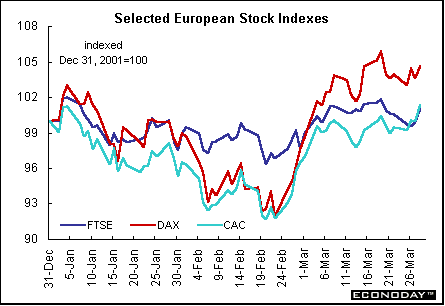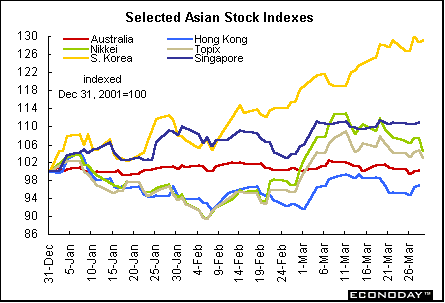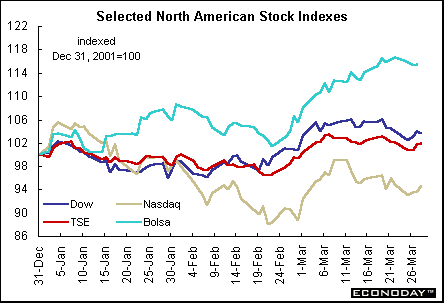
Britain and Europe
Underlying the positive first quarter finish for the FTSE, CAC and DAX are positive economic indicators. Where at one time they were universally bad, now most are good. Even German industrial production and the Ifo survey have risen two months in a row. (See indicator scoreboard.) In Britain, the consumer along with housing kept the economy from suffering a negative quarter even though manufacturing continues in the doldrums.

The FTSE 100 dragged itself into positive territory on the last trading day of the first quarter thanks to old economy stocks such as oils, drugs and banking. The FTSE rose 1.0 percent in the first quarter. Traditional cyclical stocks, which respond to an upturn in global economic conditions, performed well. However, contrary to conventional wisdom the shift into cyclicals has not been at the expense of defensive stocks. The fallout from Enron, threat of conflict in the Gulf, and a desire for earnings have helped keep defensive stocks from being overlooked.
In Europe, heavily weighted oil, pharmaceutical and banking stocks helped the Paris CAC and Frankfurt DAX end the quarter on a positive note. Once again, positive U.S. economic data buoyed investors as they sometimes placed more weight on U.S. data than on local national data. The CAC was up 1.4 percent on the quarter while the DAX was up 4.6 percent.
Asia
Only markets in Japan and South Korea were open on Friday. First quarter performance was mixed. Japanese equities had their miraculous March recovery and managed to rise 4.6 percent for the quarter and about 17 percent since the index's low on February 6! Of the Asian indexes followed here only the Hong Kong Hang Seng was down on the quarter, off 3.2 percent.

Better corporate prospects and a government crackdown on short-selling pulled the Nikkei stock market average above 11,000 from its dangerous lows of 9,500 last month. That has quelled fears of a financial crisis next month, when banks must register the market value of their equity holdings rather than the much higher purchase price.
In Korea, analysts say the Kospi's 29 percent rally this year, the second-biggest gain among regional markets, already reflects a pickup in the U.S. economy as well as an increase in domestic demand.
In Hong Kong, companies that rely on sales to the United States might lead the Hang Seng Index higher as the U.S. recovery strengthens. But heavily weighted real estate developers might be vulnerable because rising unemployment is discouraging home buyers. The Hang Seng fell 3.2 percent in the first quarter.
Americas
March proved to be the decisive month for the Dow and Toronto Stock Exchange composite 300, as they finally vaulted ahead of their year-end levels thanks to more positive economic data on both sides of the border. The Mexican Bolsa continues to defy gravity and is up 11.1 percent for the quarter. Only the South Korean Kospi has risen higher and faster. And then there is the Nasdaq, which continues to suffer from the technology malaise. However, its performance has also improved as growth prospects solidify in the United States. Nasdaq has regained over 6.6 percent in March but still has a long way to go. It is down 5.4 percent from the end of last year.



Last Week's Highlights • Global Stock Market Indexes • Recap of Global Markets • Currencies • Indicator Scoreboard

The Bottom Line • Looking Ahead
|